
Nurse Activism
A Repository of Resources, Theory, and Tools for the Engaged Nurse
Nurse Activism
A Repository of Resources, Theory, and Tools for the Engaged Nurse
We are Natural Advocates!
Applying Skill to Practice
Since all nurses already know how to be advocates for individual clients and their families, it should be quite straight forward for them to learn to apply these abilities to larger groups, communities and society at large. We can learn to harness these abilities and couple them with an activist action plan to achieve real change that supports societal health and social justice.
Advocacy in Action
Reaping the Results
Advocacy can be applied to action plans through many guises: by providing information, lobbying, forming coalitions, mobilizing constituencies, applying various media campaigns, and supporting communities in exploring the best ways for them to target, shape, and appeal to policies that affect them (whether the policiies are determined by governments, corporations, municipalities, and so on).
Nurses Raise the Profile
Improving Credibility
Nurses enjoy a high profile in the public eye: their expertise, compassion, and dligence add credibility to any advocacy or other activist campaign. Society trusts nurses to apply concrete knowledge and understanding to any issue addressed. Thus, when you DO advocate for an issue, it is taken seriously! This can be a huge advantage to any cause that may have not been regarded as serious in the past. Your involvement can make the policy makers sit up and take notice!
Advocacy is Primary
Advocacy is a set of deliberate actions in support of a cause. Advocacy is a political process that involves the coordinated efforts of people in changing existing practices, ideas, and distributions of power and resources that influence social groups and people at large. From this perspective, advocacy deals with specific aspects of policymaking, as well as the values and behavior that perpetuate exclusion and subordination.
Thus, advocacy is both about changing specific decisions affecting people's lives and changing the way decision-making happens into a more inclusive and democratic process. Inevitably, advocacy will involve tensions. Activists need to know how to analyse, plan, and manage innovative strategies with a clear understanding of potential risks. Advocacy strategies will vary widely in response to particular circumstances, issues, opportunities, and constraints.
Advocacy should be regarded as a positive force for change. Besides bringing about important change, advocacy also enables citizens to feel that they have a voice. Advocacy empowers people, educates them, and if they are advocating on their own behalf allows them to play a part in determining their own future rather than feeling like pawns in a game controlled by others.
Advocacy is not only our responsibility, as citizens, it is our right. Nurses can be key change agents to spearhead new and innovative projects for the provision of advocacy for various health and social issues, and the people affected by these issues.

"Advocacy is the deliberate process of influencing those who make policy decisions." (CARE, 1999).
It is critical that involved nurses engage in the Activist Organizational Model outlined in the previous site section, to ensure that their participation has been carefully thought out and judiciously applied.